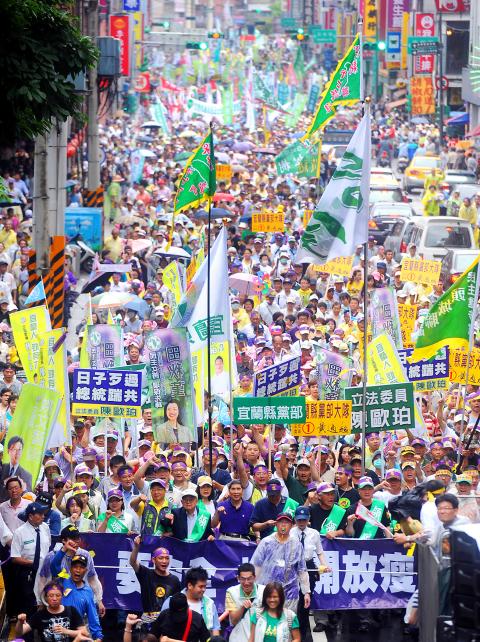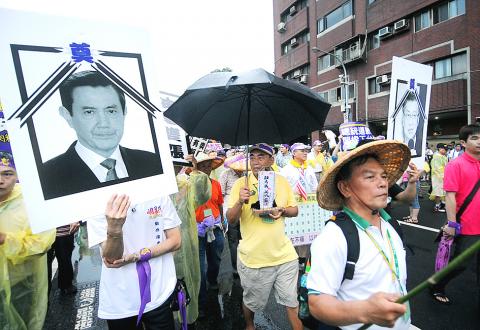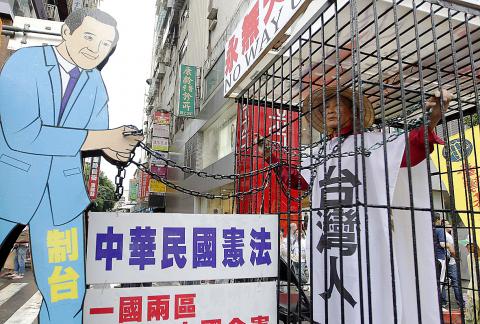People from all walks of life took to the streets in Taipei yesterday to voice their dissatisfaction with President Ma Ying-jeou’s (馬英九) governance.
A group of Hakka people held big black flags with calligraphy in white that read yimin (義民, “righteous people”) as they marched. The flag is modeled on the black flags used by Hakka militias who defended their home villages during an uprising against the Qing Dynasty in 1786 and again when they fought against the Japanese occupation of Taiwan in 1895.
“The flag symbolizes the Hakka resistance against injustice and the Hakka spirit of defending our homeland,” said Lee Ting-kun (李廷坤), from Taoyuan County. “We’re here today to tell Ma that most people are suffering in this country. We want to survive and live happily. Isn’t this what the government is supposed to do for us?”

Photo: Lo Pei-der, Taipei Times
Another group, from Greater Taichung, that stood out staged a mock funeral procession.
Two men were dressed up as Taoist priests and performed funeral rites as they marched, followed by people carrying big black-and-white portraits of Ma and Premier Sean Chen (陳?) and an ancestral tablet for the deceased with Ma’s name written on it.
“Doomed by the public, died without disease,” one placard read.

Photo: Fang Pin-chao,Taipei Times
“Skyrocketing utility prices have aroused the anger of gods and men alike,” another placard read.
A 66-year-old woman, Lee Chuang (李妝), wore a pair of hand-woven traditional shoulder pads connected to a “halo” behind her head, and held a hand-woven flag that read: “Step down.”
“This is the outfit of the goddess of mercy,” Lee told the Taipei Times. “My son had a dream a few days ago in which the goddess of mercy told him that Ma should step down to end people’s suffering, so he hand-made this outfit for me to wear in the parade.”

Photo: Reuters / Pichi Chuang
Besides being worried about rising utility prices, Lee said she was also worried that a rising national debt would increase the suffering of the next generation.
“As a mother, I’m really concerned that my children and my grandchildren will have to carry the debts that Ma leaves them,” she said.
Many people who supported Ma during the presidential election also took part in the demonstration.
“I regret voting for Ma. I regret it a lot,” one man said. “Ma had a different attitude before his election. He acted as if he cared about the people before the election, but now he doesn’t listen to what people want.”
The People First Party, normally seen as an ally of the Chinese Nationalist Party (KMT), said on Friday it encouraged its members to take part in the Democratic Progressive Party-sponsored protest on their own accord.
PFP spokesman Wu Kun-yu (吳崑玉) and PFP Taipei City Councilor Lin Kuo-cheng (林國成) were spotted in the rally yesterday, chanting slogans calling on Ma to step down.
“Ma should pay more attention to what people want; otherwise he is not suitable to be the president,” Lin said.
Chen Che (陳哲), the host of the Facebook group “Let’s Meet Up on May 20” (520我們不見不散), held up a sign that said: “Net friends, let’s meet up here,” .
“The Facebook group was created on March 18, because I think that, with so many Internet users complaining about Ma, we should do more than criticize him and his policies on the Internet. We should turn our dissatisfaction into action,” he said, adding that two months after the online group was created, it has attracted nearly 3,000 members.
Chang Chia-ling (張嘉玲), director of the DPP’s Department of Women’s Development, also caught many people’s eye when she joined the rally at one of the assembly points, outside National Taiwan University campus, in her bright red wedding gown.
“I came directly from my wedding banquet,” she said. “I will remember this day for all my life, not only because it’s my wedding day, but also because this is the day when so many Taiwanese people have come out to tell the government that we’re suffering.”

Alain Robert, known as the "French Spider-Man," praised Alex Honnold as exceptionally well-prepared after the US climber completed a free solo ascent of Taipei 101 yesterday. Robert said Honnold's ascent of the 508m-tall skyscraper in just more than one-and-a-half hours without using safety ropes or equipment was a remarkable achievement. "This is my life," he said in an interview conducted in French, adding that he liked the feeling of being "on the edge of danger." The 63-year-old Frenchman climbed Taipei 101 using ropes in December 2004, taking about four hours to reach the top. On a one-to-10 scale of difficulty, Robert said Taipei 101

Nipah virus infection is to be officially listed as a category 5 notifiable infectious disease in Taiwan in March, while clinical treatment guidelines are being formulated, the Centers for Disease Control (CDC) said yesterday. With Nipah infections being reported in other countries and considering its relatively high fatality rate, the centers on Jan. 16 announced that it would be listed as a notifiable infectious disease to bolster the nation’s systematic early warning system and increase public awareness, the CDC said. Bangladesh reported four fatal cases last year in separate districts, with three linked to raw date palm sap consumption, CDC Epidemic Intelligence

Taiwanese and US defense groups are collaborating to introduce deployable, semi-autonomous manufacturing systems for drones and components in a boost to the nation’s supply chain resilience. Taiwan’s G-Tech Optroelectronics Corp subsidiary GTOC and the US’ Aerkomm Inc on Friday announced an agreement with fellow US-based Firestorm Lab to adopt the latter’s xCell, a technology featuring 3D printers fitted in 6.1m container units. The systems enable aerial platforms and parts to be produced in high volumes from dispersed nodes capable of rapid redeployment, to minimize the risk of enemy strikes and to meet field requirements, they said. Firestorm chief technology officer Ian Muceus said

MORE FALL: An investigation into one of Xi’s key cronies, part of a broader ‘anti-corruption’ drive, indicates that he might have a deep distrust in the military, an expert said China’s latest military purge underscores systemic risks in its shift from collective leadership to sole rule under Chinese President Xi Jinping (習近平), and could disrupt its chain of command and military capabilities, a national security official said yesterday. If decisionmaking within the Chinese Communist Party has become “irrational” under one-man rule, the Taiwan Strait and the regional situation must be approached with extreme caution, given unforeseen risks, they added. The anonymous official made the remarks as China’s Central Military Commission Vice Chairman Zhang Youxia (張又俠) and Joint Staff Department Chief of Staff Liu Zhenli (劉振立) were reportedly being investigated for suspected “serious